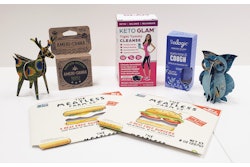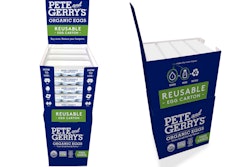While at the same time, the arguments of anti-plastics and anti-packaging forces seem to be getting more radical.
(Own-horn tooting: We recently noted that this realm would remain active, even as an aggressive California law failed to pass last year. Read more at pwgo.to/5534).
Federal legislation is being floated that would ban some single-use plastics or make changes to nationwide recycling systems, but the bills’ prospects for passage appear low, though some even have the support of industry groups. We’ll revisit them if they gain traction.
Meanwhile, instead of the legislation track, one environmental group has an aggressive new idea: It has sued major companies including Coca-Cola, PepsiCo, Nestle, Mars, and Danone, on grounds of creating a “public nuisance,” for failure to warn, breach of warranty, and making products with design defects, among other claims, for marketing their products in plastic bottles.
That’s right, the plaintiff organization thinks the companies should be legally liable for selling their products in plastic and thereby causing damage to consumers. The plaintiff, the Earth Island Institute, filed its case in California state court in San Mateo County near San Francisco, and says these companies “created the condition of plastic pollution, which is extraordinarily harmful to humans, animals, and the environment,” because lots of plastic ends up in the ocean and causes harm there and in other waterways.
The defendant companies, they allege, “have known for decades” that “recycling by itself cannot prevent plastic pollution from damaging oceans, waterways, and coasts,” and they “refuse to adopt more sustainable alternatives in order [to] reap higher profits resulting from using virgin plastic.” They say the companies have placed the blame for plastic pollution on “consumers and public entities” via a “campaign of misinformation.”
They seem to be saying that the companies’ actions designed to appeal to environment-conscious consumers, such as adopting recyclable packaging, are only misleading to the public and shift responsibility away from the companies themselves.
These assertions about the companies’ motivations and the effects of plastic pollution are not new. But what is very, very new is to try to claim that the companies’ actions are the basis of claims for legal liability because they are a public nuisance or a breach of warranty or constitute a failure to warn consumers in some way.
I suppose you need a vivid imagination to make such claims, but it’s not clear that any of them have any realistic chance of success. It might be best to view the legal complaint as a press release designed to build public support for extended producer responsibility (EPR) laws.
My own observation is that, in the decades during which I have been a columnist and observer of the packaging scene, there are some debates that don’t seem to have changed much. If packaging ends up as litter, laws are proposed to reduce the litter, while packaging makers and users point to the many benefits and values that packaging provides and urge a broader perspective such as a life-cycle analysis approach to fully appreciate the energy used in manufacture and efficiencies and benefits during each package’s use.
In recent years, what the industry considers the public policy failures relating to the handling of solid waste are increasingly being characterized as failures of the packaging makers and users themselves, and that’s how we end up with extended producer responsibility proposals. What is newer now is that so many companiesare doing so many truly creative things with packaging materials and configurations and recycling systems, motivated as much by consumer demands for action as by legislative requirements or the fear of them.
Early this year, the Consumer Brands Association (recently renamed from Grocery Manufacturers Association) announced a Recycling Leadership Council whose American Recycling Roadmap “will seek consistency in the recycling system and guide advocacy at the federal, state and local level.” The inconsistency of recycling systems nationwide is an initial target, as it causes consumer confusion and doesn’t take advantage of the latest technologies, they say.
The stakeholder members include a variety of important groups representing industries with an interest in recycling, including the American Beverage Association, AMERIPEN, Closed Loop Partners, the Consumer Brands Association, the Food Marketing Institute, the Glass Packaging Institute, The Recycling Partnership, and others.
The Consumer Brands Association says its goal is to “reimagine the U.S. recycling system,” and has created what it calls the American Recycling Roadmap together with packaging companies and other stakeholders. Their hope is to achieve “consistency in the recycling system and guide advocacy at the federal, state and local level.” The group points to what it says are almost 10,000 “unique recycling systems” which it says only makes worse the packaging and waste crisis because it leads to consumer confusion and doesn’t take full advantage of packaging recycling technologies.
The packaging industry is certain to be affected by developments like these. More news as it develops.
Eric Greenberg can be reached at [email protected]. Or visit his firm’s Web site at www.ericfgreenbergpc.com.
INFORMATIONAL ONLY, NOT LEGAL ADVICE.

























